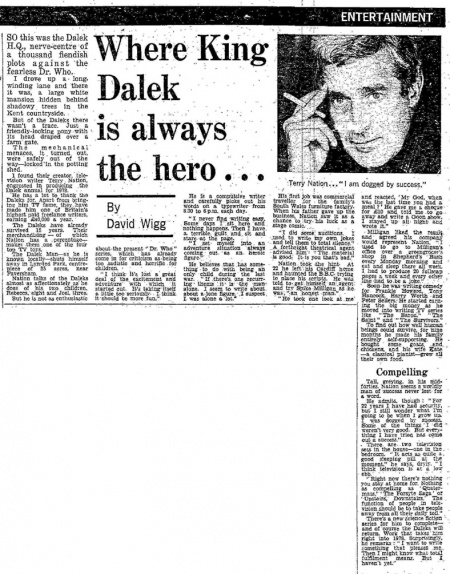Where King Dalek is always the hero...
- Publication: Daily Express
- Date: 1977-01-10
- Author: David Wigg
- Page: 10
- Language: English
SO this was the Dalek HQ., nerve-centre of a thousand fiendish plots against the fearless Dr. Who.
I drove up a long winding lane and there it was, a large white mansion hidden behind shadowy trees in the Kent countryside.
But of the Daleks there wasn't a trace. Just a friendly-looking pony with its head draped over a farm' gate.
The mechanical Menaces, it turned out, were safely out of the way—locked 'in the potting shed.
I found their creator, television writer Terry Nation, engrossed in producing the Dalek annual for 1978.
He has a lot to thank the Daleks for. Apart from bringing him TV fame, they have made him one of Britain's highest paid freelance writers, earning £40,000 a year.
The Daleks have already survived 15 years. Their merchandising — of which Nation has a percentage, makes them one of the four top TV toys.
The Dalek Man—as he is known locally—shuts himself away in Lynsted Park, centrepiece of 35 acres, near Faversham.
Nation talks of the Daleks almost as affectionately as' he does of his two children, Rebecca, eight and Joel, three.
But he is not as enthusiastic about the present "Dr. Who" series, which has already come in for criticism as being too sadistic and horrific for children.
"I think it's lost a great deal of the excitement and adventure with which it started out. It's taking itself a little too seriously. I think it should be more fun.
He is a compulsive writer and carefully picks out his words on a typewriter from 8.30 to 6 p.m. each day.
"I never find writing easy. Some days I sit here and nothing happens. Then I have a terrible guilt and, sit and stare at the page.
"I set myself into an adventure situation always coming out as an heroic figure."
He believes that has something to do with being an only child during the last war. "If there's one recurring theme it is the man alone. I seem to write about about a lone figure. I suspect I was alone a lot."
His first job was commercial traveller for the family's South Wales furniture factory. When his father gave up the business Nation saw it as a chance to try his luck as a stage comic.
"I did some auditions. I used to write my own jokes and tell them to total silence."
A forthright theatrical agent advised him: "The material is good. It is you that's bad."
Nation took the hint. At 22 he left his Cardiff home and haunted the B.B.C. trying to place his scripts. He was told to get himself an agent and try Spike Milligan as he was "an honest man."•
"He took one look at me and reacted, 'My God, when was the last time you had a meal?' He gave me a cheque for £10 and told me to go away and write a Goon show. I stayed up all night and wrote it."
Milligan liked the result and agreed his company would represent Nation. "I used to go to Milligan's office over a greengrocer's shop in Shepherd's Bush every Monday morning and eat and sleep there all week. I had to produce 20 fullscap pages a week and every other line had to be a joke."
Soon he was writing comedy for Frankie Howerd, Tony Hancock, Harry Worth and Peter Sellers. He started earning the big money as he moved into writing TV series like "The Baron," "The Saint" and "The Survivors."
To find out how well human beings could survive, for nine months he made his family entirely self-supporting. He bought some goats, and chickens, and his wife Kate —a classical pianist—grew all their own food.
Compelling
Tall, greying, in his mid-forties. Nation seems a worldly man of success never - lost - for a word.
He admits, though: "For 22 years I have had security, but I still wonder what I'm going to be when I grow up. I was dogged by success. Some of the things I did weren't very good. But everything I have tried has come out a success."
There are two television sets in the house—one in the bedroom. 'It acts as quite a good sleeping pill at the moment," he says, dryly. "I think television is at a low ebb."
Right now there's nothing you stay at home for. Nothing as compelling as 'Quatermass,' 'The Forsyte Saga' or 'Upstairs, Downstairs.' The function of people in television should be to take people away from all their daily toil."
There's a new science fiction series for him to complete and of course the Daleks will return. Work that takes' him right into 1978. Surprisingly, he remarks: "I want to write something that pleases me. Then I might know what total fulfilment means. But I haven't yet."
Disclaimer: These citations are created on-the-fly using primitive parsing techniques. You should double-check all citations. Send feedback to whovian@cuttingsarchive.org
- APA 6th ed.: Wigg, David (1977-01-10). Where King Dalek is always the hero.... Daily Express p. 10.
- MLA 7th ed.: Wigg, David. "Where King Dalek is always the hero...." Daily Express [add city] 1977-01-10, 10. Print.
- Chicago 15th ed.: Wigg, David. "Where King Dalek is always the hero...." Daily Express, edition, sec., 1977-01-10
- Turabian: Wigg, David. "Where King Dalek is always the hero...." Daily Express, 1977-01-10, section, 10 edition.
- Wikipedia (this article): <ref>{{cite news| title=Where King Dalek is always the hero... | url=http://cuttingsarchive.org/index.php/Where_King_Dalek_is_always_the_hero... | work=Daily Express | pages=10 | date=1977-01-10 | via=Doctor Who Cuttings Archive | accessdate=24 May 2025 }}</ref>
- Wikipedia (this page): <ref>{{cite web | title=Where King Dalek is always the hero... | url=http://cuttingsarchive.org/index.php/Where_King_Dalek_is_always_the_hero... | work=Doctor Who Cuttings Archive | accessdate=24 May 2025}}</ref>
